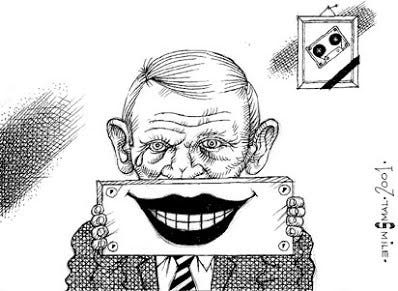putting the melnychenko tapes in context
***
***
***
dedicated to the tin-eared and hard of hearing
kyiv, ukraine. april 19, 2001
ukrainians have known for years that foreign linguistic experts pick up on much less in conversation than native speakers. however, few expected that the time would come when the standard of competency turns out to be the ability to construe accurately what have been officially classified as state secrets.
while the participants in conversations allegedly recorded in president leonid kuchma’s office seem to understand what they are saying, foreign specialists — even employees of radio liberty’s ukrainian service — are still struggling to keep up, at least publicly.
much is taken for granted between the speakers recorded, whoever they really are, and important communications take place without explicit linguistic reference. to the uninformed and tin-eared, the flow of words seems continuous, despite clear markers of the boundaries of meaningful information.
professional transcribers know, of course, that listening comprehension is a classic learn-by-doing task, in which it is essential to adopt the strategy of listening for key elements around which to construct meaning, all the while moving along with the flow of discourse.
in reading mode, difficulties can readily be solved by rescanning the text, since the reader controls how information reaches the eyes. but listening is quite different.
those familiar with the recordings cannot effectively ask decision-makers in the west to listen faster, nor will study of non-normative speech per se produce direct improvement in their ability to hear at the rate kuchma and comrades speak.
western analysts who have listened to the conversations are either finding it enormously difficult to understand what is actually being said or are playing dumb while busily compartmentalizing the intelligence for future use.
in any case, forensic linguists employed by ukraine’s law organs have yet to come up with anything much better for helping locals comprehend what was allegedly said, much less by whom or when.
in ukraine just like anywhere else, people interrupt each other and talk at the same time, ambient noise masks speech sounds, and politicians do not pronounce words as consistently as the written language would lead us to believe. but missing (and superfluous) acoustic signals are more than compensated for by situational and contextual elements in the conversations.
that some hear what may be obscured or totally lacking in the recordings is principally because a significant portion of what can be understood is supplied by the context of the exchanges. native speakers draw on vast amounts of shared knowledge to construct meaning when they are listening. it is not so much that the speech sounds contain meaning; it is rather that they trigger meaning.
as an example, consider this dialogue in which [now former] state security chief leonid derkach reports to kuchma on the whereabouts of oleg yeltsov, the investigative ukrainian journalist who fled to armavir in the south of russia on sept. 16, the day journalist georgy gongadze disappeared in kyiv.
relying chiefly on the derkach’s voice quality and hesitant speech, kuchma appears to understand that a major scandal is in the offing.
here is a partially translated transcript of the actual exchange, which evidently took place a short time after gongadze vanished. (the content of this translation differs in several important details from the ukrainian transcript of this conversation that was posted on radio liberty’s web site on march 28.)
kuchma: what’s up with yelkovich?
derkach: do you mean yeltsov?
kuchma: yes, yeltsov.
derkach: i already said, er, filed a report.
kuchma: i see that it is your report.
derkach: well, they scared him. they called, uh, er, um, [in kyiv]. and he fled to armavir, to his mother.
kuchma: so, he’s not here [in ukraine] any more.
derkach: no, but he called his wife from armavir a couple of times and told her, ‘i don’t know when i’ll be back, maybe in a week or so.’ i’m not sure, though, because of the gongadze thing. we told the fsb [russian secret service] of the situation there.
the informed listener can easily fill in the missing or slurred elements — including the name armavir — by assuming that both kuchma and derkach are interested in yeltsov’s whereabouts, even though neither elaborates that knowledge in depth.
one can also deduce that even though kuchma has a temporary lapse of memory when it comes to yeltsov’s name, he certainly knows who he is.
the ability to fill in missing information, a commonplace in human behavior, has been termed analysis by synthesis by psychologists. it refers to the strategy of internally generating or shadowing what people say (or do) so that we may more easily reduce the number of possibilities to consider.
policy makers in the west should take the time and make full use of their processing capacity to thoroughly examine and publish the secret recordings allegedly made in kuchma’s office. as long as ignorance is bliss, ukraine’s future will be static.



